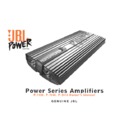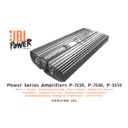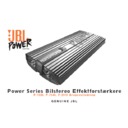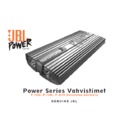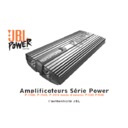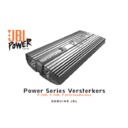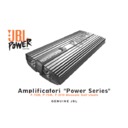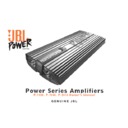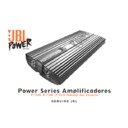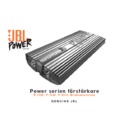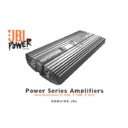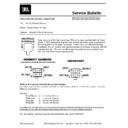Read JBL P 7520 (serv.man3) User Guide / Operation Manual online
Power Series Amplifiers
P-7520, P-7540, P-2510 Owner ’s Manual
G E N U I N E J B L
2
Amplifier Features
• 4, 3 or 2 channel Operation (P-7540),
2 or One channel Operation (P-7520),
Mono Class-D subwoofer channel
(P-2510)
Mono Class-D subwoofer channel
(P-2510)
• Simultaneous stereo and mono
Operation (P-7520, P-7540)
• Built-in 12dB/oct variable electronic
crossover
• Balanced Differential Input
• Front and Rear Summing Inputs (P-2510)
• Front and Rear Summing Inputs (P-2510)
for Non-fading Bass
• Pre-amp outputs with crossover (P-7520,
P-7540)
• Oversized Floating Rail Mosfet Power
Supply
• Universal Interface
• Common Sense Turn-on
• Variable Input Sensitivity (250mV-4V)
• Fully Complementary, Direct Coupled
• Common Sense Turn-on
• Variable Input Sensitivity (250mV-4V)
• Fully Complementary, Direct Coupled
Discrete Power Amplifier Circuitry
• Ultra-efficient Class-D Subwoofer
Amplifier (P-2510)
• Gold-Plated Power, Input and Output
Connectors
• 2-Ohm Stable (stereo)
• JBL badge lights when amp is
• JBL badge lights when amp is
operating, and flashes when protection
circuit is activated
circuit is activated
• Made in USA
About This Manual
To attain maximum amplifier
performance, we encourage you to read
the remaining pages before installing and
operating your new JBL Power Series
Amplifier. Especially review the
Applications section for ideas on
designing and expanding your system.
Also, save these instructions for future
reference.
IMPORTANT: Installation of automotive
stereo components can require extensive
experience in performing a variety of
electrical and mechanical procedures.
Although these instructions explain how
to install a JBL Power Series Amplifier in
a general sense, they do not show the
exact installation methods for your
particular vehicle. If you do not have the
experience, do not attempt the
installation yourself; instead ask your
Authorized JBL Car Audio Dealer about
professional installation options.
performance, we encourage you to read
the remaining pages before installing and
operating your new JBL Power Series
Amplifier. Especially review the
Applications section for ideas on
designing and expanding your system.
Also, save these instructions for future
reference.
IMPORTANT: Installation of automotive
stereo components can require extensive
experience in performing a variety of
electrical and mechanical procedures.
Although these instructions explain how
to install a JBL Power Series Amplifier in
a general sense, they do not show the
exact installation methods for your
particular vehicle. If you do not have the
experience, do not attempt the
installation yourself; instead ask your
Authorized JBL Car Audio Dealer about
professional installation options.
Installation Precautions And Notes
• The JBL Power Series amplifiers have
five levels of circuit protection that
monitor the amplifiers and will shut
them down if the electrical system
voltage drops below 5 Vdc or exceeds
18 Vdc, temperatures are above 194° F
(90° C), short circuits occur, or current
draw exceeds product specifications. For
best performance, check the intended
mounting site to make sure the
operating environment does not create
conditions that will trigger circuit
protection.
monitor the amplifiers and will shut
them down if the electrical system
voltage drops below 5 Vdc or exceeds
18 Vdc, temperatures are above 194° F
(90° C), short circuits occur, or current
draw exceeds product specifications. For
best performance, check the intended
mounting site to make sure the
operating environment does not create
conditions that will trigger circuit
protection.
• Prior to installation, turn off all audio
systems and other electrical devices.
Also disconnect the (–) negative lead
from the vehicle’s battery.
Also disconnect the (–) negative lead
from the vehicle’s battery.
• At the installation site, locate and make
a note of all fuel lines, hydraulic brake
lines, and electrical wiring. Use extreme
caution when cutting or drilling in and
around these areas.
lines, and electrical wiring. Use extreme
caution when cutting or drilling in and
around these areas.
• Check clearances on both sides of a
planned mounting surface before
drilling any holes or installing any
screws. Remember that mounting
screws can extend behind the mounting
surface.
drilling any holes or installing any
screws. Remember that mounting
screws can extend behind the mounting
surface.
Thanks
for purchasing your new JBL
Power Series Amplifier. Power Series
amplifiers feature the latest advances in
discrete circuit topology ensuring low
distortion and superbly clean and clear
sound quality. In addition to RCA type
pre-amp inputs, Power Series amplifiers
feature Universal Interface™, designed to
facilitate integration with factory installed
audio systems for distortion free
performance that rivals conventional pre-
amp connections. Included in the
Universal Interface circuit is Common
Sense™ turn-on. Common Sense turn-on
senses the common-mode voltage
present on the speaker outputs of factory
and aftermarket radios, turning on the
amplifier without a separate remote wire.
All Power Series amplifiers feature built-
in electronic crossovers and pre-amp
outputs for easy system expansion
without requiring outboard processors.
amplifiers feature the latest advances in
discrete circuit topology ensuring low
distortion and superbly clean and clear
sound quality. In addition to RCA type
pre-amp inputs, Power Series amplifiers
feature Universal Interface™, designed to
facilitate integration with factory installed
audio systems for distortion free
performance that rivals conventional pre-
amp connections. Included in the
Universal Interface circuit is Common
Sense™ turn-on. Common Sense turn-on
senses the common-mode voltage
present on the speaker outputs of factory
and aftermarket radios, turning on the
amplifier without a separate remote wire.
All Power Series amplifiers feature built-
in electronic crossovers and pre-amp
outputs for easy system expansion
without requiring outboard processors.
3
• Always wear protective eyewear when
using tools.
• When routing cables, keep input signal
cables away from power cables and
speaker wires.
speaker wires.
• When making connections, make sure
that each connection is clean, insulated,
and properly secured. Observe the
polarity markings on the rear panel.
Refer to the application drawings to set
up the amplifier for operation in stereo,
bridged-mono, bi-amp, or tri-mode
configurations.
and properly secured. Observe the
polarity markings on the rear panel.
Refer to the application drawings to set
up the amplifier for operation in stereo,
bridged-mono, bi-amp, or tri-mode
configurations.
• If the amplifier’s fuse must be replaced,
use only the same rating and type as a
replacement. Do not substitute another
kind.
replacement. Do not substitute another
kind.
Controls and Connectors
1. Pre-amp Level Input Connector–
Connects to line level output from the
source unit.
source unit.
2. Universal Interface Speaker Level
Connector-Connects to speaker level
output from the source unit. Provides
Common Sense amplifier turn-on
when used with factory radios.
(2-channel on P-7520, 4-channel on
P-7540)
output from the source unit. Provides
Common Sense amplifier turn-on
when used with factory radios.
(2-channel on P-7520, 4-channel on
P-7540)
3. Pre-amp Level Output Connector-
connects to other amps or processors
in the signal chain (flat on P-7520, flat
or filtered on P-7540)
in the signal chain (flat on P-7520, flat
or filtered on P-7540)
4. Speaker Output Connector - (2-channel
on P-7520, 4-channel on P-7540)
5. Fuses-P-7520: 30A ATC type P-7540:
30A ATC type x 2, P-2510: 40A ATC type.
6. Power Connector-Connections for
12V +, Gnd. and Rem.
7. Input Mode Switch-Sums left and right
inputs.
8. Input Sensitivity Control-Adjusts input
sensitivity for pre-amp level and
speaker level inputs.
speaker level inputs.
9. Pre-amp Output Selector Switch-
Selects input path for pre-amp output.
Output can be summed from front and
rear inputs with no filter, or filtered by
the front or rear crossover.
Output can be summed from front and
rear inputs with no filter, or filtered by
the front or rear crossover.
10. Rear Channel Input Selector-Selects
rear channel input between front input
and rear input.
and rear input.
11. Crossover Selector-Determines
whether the crossover is a High Pass
filter (HP), Low Pass filter (LP), or
unfiltered (flat).
filter (HP), Low Pass filter (LP), or
unfiltered (flat).
12. Crossover Frequency Control-
Determines the crossover frequency
for the amplifier channels (front or
rear) and the pre-amp outputs.
for the amplifier channels (front or
rear) and the pre-amp outputs.
FUSE
30A
BRIDGE
– R +
– L +
MADE IN THE U.S.A.
+BATT
REM
GND
BRIDGE
SPEAKER OUTPUTS
POWER
FRONT
REAR
30
FUSE
30A
30
+R–
+R–
–L+
–L+
AUX
OUT
OUT
R
L
R
L
FRONT
FRONT
REAR
LINE LEVEL
INPUT
SPKR LEVEL IN
REAR
ST MO
INPUT MODE
LEVEL
INPUT
PRE OUT
LEVEL
INPUT MODE
MO ST
MO ST
6V
.250V
4V
.250V
FRONT
F+R
FLAT
REAR
LP
FRT
LP
LP
FRT
REAR
REAR
XOVER
FLAT HP LP
XOVER
FLAT HP
LP
XOVER
AMP
AMP
XOVER
AMP
32Hz
80Hz
320Hz
32Hz
80Hz
2V
2V
320Hz
7540
R
L
LINE LEVEL
INPUT
SPEAKER LEVEL IN
R
+
–
L
+
–
AUX
OUT
R
L
30
– R +
– L +
+BATT
REM
GND
FUSE
30A
MADE IN THE U.S.A.
BRIDGE
SPEAKER OUTPUTS
POWER
PRE OUT
LEVEL
INPUT MODE
MO ST
4V
.250V
XOVER
FLAT
HP
LP
FLAT
HP
LP
2V
FREQ
32Hz
320Hz
80Hz
9
10
8
7
12
8
11
2
3
4
6
5
1
12
7
11
2
3
1
8
11
12
9
7
4
5
6
P-7520
P-7540
3. If you are running either the P-7520 or
the P-7540 in Tri-Mode (stereo and
mono simultaneously to one or two
pairs of satellite speakers and a
subwoofer), refer to the chart above
to determine the capacitor and
inductor values you’ll need to route
bass signals to the woofer, and
midrange and high frequencies to the
satellite speakers. These passive
crossover components will also ensure
that the impedance of the speaker
system doesn’t drop below 2 Ohms.
The P-2510 should be used to drive
woofers only as its bandwidth is
limited to 20Hz - 320Hz.
mono simultaneously to one or two
pairs of satellite speakers and a
subwoofer), refer to the chart above
to determine the capacitor and
inductor values you’ll need to route
bass signals to the woofer, and
midrange and high frequencies to the
satellite speakers. These passive
crossover components will also ensure
that the impedance of the speaker
system doesn’t drop below 2 Ohms.
The P-2510 should be used to drive
woofers only as its bandwidth is
limited to 20Hz - 320Hz.
Wiring the Input Connections
1. If you are using conventional RCA
input connections and a source unit
with output voltage less than 4V,
simply plug the RCA plugs into the
RCA jacks on the amplifier.
with output voltage less than 4V,
simply plug the RCA plugs into the
RCA jacks on the amplifier.
4
Mounting The Amplifier
The JBL P-7520, P-7540, or P-2510 can be
mounted in virtually any location inside
the vehicle. However, make sure to keep
the amplifier away from heater vents or
ducts.
1. At the chosen site, use the amplifier as
mounted in virtually any location inside
the vehicle. However, make sure to keep
the amplifier away from heater vents or
ducts.
1. At the chosen site, use the amplifier as
a mounting template and mark
locations of the four mounting holes.
locations of the four mounting holes.
2. Drill a small pilot hole at each marked
location.
3. Mount the amplifier and securely
tighten the mounting screws.
Wiring the Speaker Output
Connections
Connections
1. Connect the speakers, observing
proper polarity, to the speaker output
barrier strip on the amplifier using at
least 1,25 mm
barrier strip on the amplifier using at
least 1,25 mm
2
high quality speaker
wire. (Note: The total impedance of the
speakers connected to the outputs
when the amp is driven in stereo must
be at least 2 Ohms. Because the
P-2510 is a single channel amplifier,
the speaker connections on the barrier
strip are wired in parallel inside the
amp. The total impedance of the
speakers connected to the P-2510 must
be at least 2 Ohms.)
speakers connected to the outputs
when the amp is driven in stereo must
be at least 2 Ohms. Because the
P-2510 is a single channel amplifier,
the speaker connections on the barrier
strip are wired in parallel inside the
amp. The total impedance of the
speakers connected to the P-2510 must
be at least 2 Ohms.)
2. If you are bridging the amplifier,
connect the speaker wires to the
terminals marked “bridge” observing
proper polarity. (Note: The total
impedance of the speaker system to
be connected to the amplifier must be
at least 4 Ohms in bridge mode)
terminals marked “bridge” observing
proper polarity. (Note: The total
impedance of the speaker system to
be connected to the amplifier must be
at least 4 Ohms in bridge mode)
FREQUENCY
INDUCTOR
CAPACITOR
Crossover
6dB/oct. LP
6dB/oct. HP
(4 ohm)
(4 ohm)
75Hz
8.0mH
530µF
100Hz
6.4mH
400µF
125Hz
5.0mH
318µF
150Hz
4.2mH
265µF
175Hz
3.6mH
227µF
200Hz
3.2mH
198µF
40
+ +
– –
MADE IN THE U.S.A.
SPEAKER OUTPUTS
FUSE
40A
+BATT
REM
GND
POWER
+ R –
+ R –
– L +
– L +
R
L
FRONT
FRONT
REAR
LINE LEVEL
INPUT
UNIVERSAL INTERFACE
REAR
LEVEL
FREQ
4V
.250V
32Hz
80Hz
320Hz
2V
8
1
2
4
6
12
5
P-2510
Wiring The Power Connections
Refer to Figures 1-6 for connector
locations.
1. For power, remote, and speaker wires,
locations.
1. For power, remote, and speaker wires,
strip 1⁄4" off one end of each jacket to
reveal bare wire for insertion into the
barrier strip connectors.
reveal bare wire for insertion into the
barrier strip connectors.
2. Locate the 3-connection barrier strip
labeled +Batt, Rem and Gnd. Connect
a black wire (at least 2.5 mm
a black wire (at least 2.5 mm
2
) to the
Gnd terminal and connect the other
end to the nearest bare-metal chassis
component. Then, connect a red wire
(at least 2.5 mm
end to the nearest bare-metal chassis
component. Then, connect a red wire
(at least 2.5 mm
2
) from the vehicle’s
+12-volt battery terminal to the +Batt
terminal on the barrier strip. Finally
connect a blue wire (1,25 mm
terminal on the barrier strip. Finally
connect a blue wire (1,25 mm
2
) to the
Rem terminal on the barrier strip and
connect the other end to the Rem
output of the source unit. If you are
using speaker level inputs and speaker
level outputs from the source,
disregard the previous instruction
regarding the Rem terminal.
connect the other end to the Rem
output of the source unit. If you are
using speaker level inputs and speaker
level outputs from the source,
disregard the previous instruction
regarding the Rem terminal.

